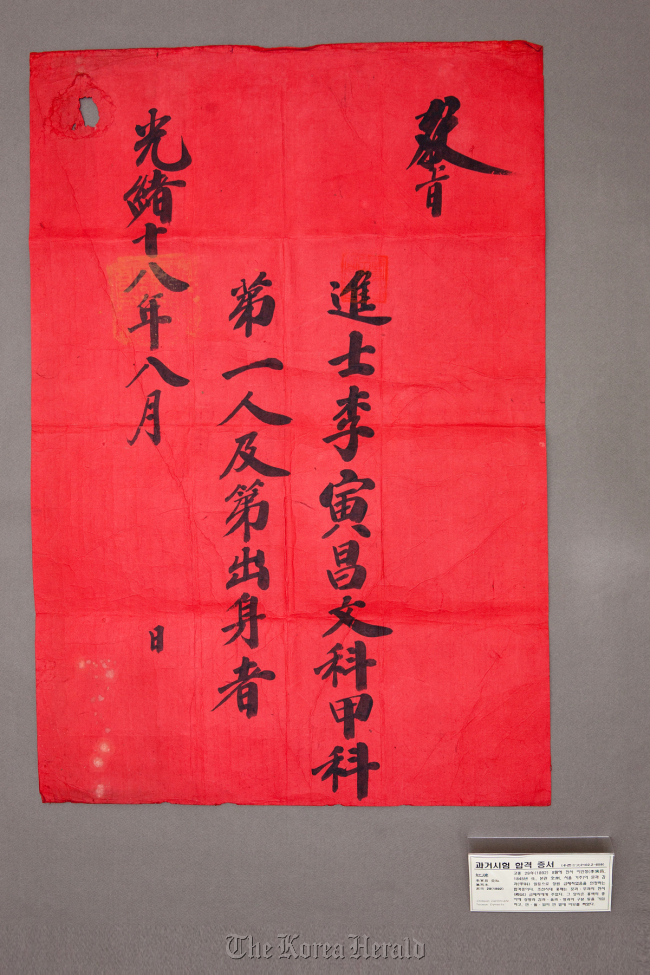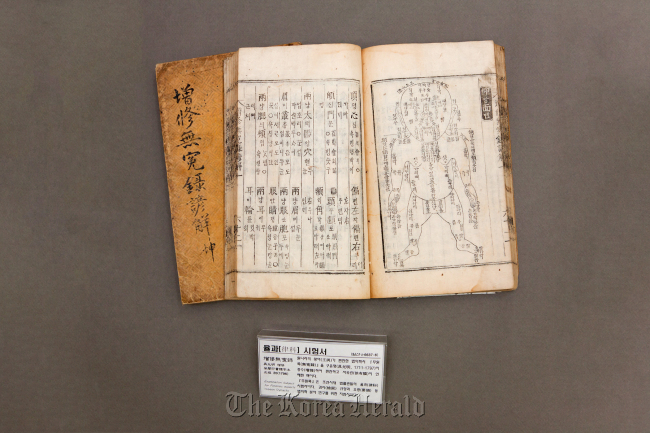Gwageo: Gateway to success in Joseon
Exhibition highlights the 500-year history of civil service exam
By Korea HeraldPublished : Jan. 3, 2013 - 19:56
Long before the college scholastic ability test, TOEIC or TOEFL, there was Gwageo, a civil servant examination in Korea.
Launched in 958 benchmarking the Chinese model, Gwageo became the official gateway to public officialdom, which was regarded as the “only honorable way” for noblemen to live in the Joseon era (1392-1910). It was abolished in 1894 when Westernization of the government system kicked off and the exam was named one of the bad, old customs.
The National Library is holding a special exhibition, “Gwageo: the test and success,” until March 29. From textbooks ― mostly Confucius lessons from China stressing the relations between King and his people ― a total of 23 types of document and books will be exhibited, including test papers, answer sheets and certificates of passing the examination.
Hard to pass
Passing the test was lucrative ― passing Mungwa, or a humanity test about administration, ethics and family, granted immediate employment as a government official. Since the test was held once every three years, the chances of being selected as one of the 25-30 people per session were extremely slim.
Launched in 958 benchmarking the Chinese model, Gwageo became the official gateway to public officialdom, which was regarded as the “only honorable way” for noblemen to live in the Joseon era (1392-1910). It was abolished in 1894 when Westernization of the government system kicked off and the exam was named one of the bad, old customs.
The National Library is holding a special exhibition, “Gwageo: the test and success,” until March 29. From textbooks ― mostly Confucius lessons from China stressing the relations between King and his people ― a total of 23 types of document and books will be exhibited, including test papers, answer sheets and certificates of passing the examination.
Hard to pass
Passing the test was lucrative ― passing Mungwa, or a humanity test about administration, ethics and family, granted immediate employment as a government official. Since the test was held once every three years, the chances of being selected as one of the 25-30 people per session were extremely slim.

“In the Joseon period, academic aptitude in Confucius studies was prioritized and admired the most. Making money was never the concern among aristocrats or even commoners. Therefore passing the test was an honor for the family,” said Ahn Hye-kyong, a rare book specialist at the Korea Research Institute for Library and Information. “The crimson certificate issued to those who passed the exams was handed down from generation to generation as a family treasure.”
Lee Yi (1536-1584), one of the two greatest Confucian scholars in the Joseon period along with Yi Hwang (1501-1570), was a “wunderkind” everyone envied: He topped the Mungwa exam and primary tests nine times, which garnered him the moniker of “nine-time winner.”

“It was a record that no one dared to break. Passing Mungwa itself is often compared to passing the Bar exam, civil service exam and foreign service exam. Just imagine what nine-time winner means!” Ahn said. Once asked why he took so many tests in the first place, Yi humbly said, “To make my parents happy.”
Today, judges, doctors and interpreters are among the most sought after jobs among youngsters and their parents, but in the Joseon era it was the opposite ― the aristocrats stuck with the classics while the lower classes took over the “practical skills.”
The government held Japgwa as part of Gwageo for such positions. Commoners studied medicine, law, astrology and fortune-telling as well as translation and interpretation. They would study books from China, with the Korean language pronunciation noted next to the Chinese characters.
Nowadays everyone writes with computers and fine penmanship is not highly appreciated. But penmanship was a very important factor in passing the exams back then. One of the exhibited items is the answer sheet by Kim Yeong-jik, who ranked second in 1888. His writing is neat and calm, unlike the anxious and tense atmosphere of the exam center.
“Calligraphy was important. Those with bad handwriting failed regardless of the quality of the content,” Ahn said.
Good or evil?
Gwageo solidified the status of noblemen. The government checked the background of those who passed the exam and wrote the hometown of the family as well as name of the parents along with the name of the successful candidate on the announcement of the exam results. Those with unimpressive family names ― those lesser known or with a bad reputation ― failed while those from well-known clans advanced into officialdom.
And as Joseon headed to the end of its days, cheating and other irregularities corrupted the Gwageo scene. Lower-class candidates bought the identification from poor noblemen and applied for Gwageo or paid someone else to take the test.
“There was violence, corruption and unfairness everywhere,” wrote Kang Myeong-kwan, a historian, in a paper on Gwageo.
But Ahn begged to differ.
“Toward the end it is true that the test had become less transparent. But we must understand that Gwageo intended to seek talent without ranking and other social barriers. In early Goryeo (918-1392) era, it was just a handful of powerful families who passed down their power. Gwageo changed that to a meritocracy,” she said.
By Bae Ji-sook (baejisook@heraldcorp.com)
-
Articles by Korea Herald








![[Graphic News] More Koreans say they plan long-distance trips this year](http://res.heraldm.com/phpwas/restmb_idxmake.php?idx=644&simg=/content/image/2024/04/17/20240417050828_0.gif&u=)
![[KH Explains] Hyundai's full hybrid edge to pay off amid slow transition to pure EVs](http://res.heraldm.com/phpwas/restmb_idxmake.php?idx=644&simg=/content/image/2024/04/18/20240418050645_0.jpg&u=20240419100350)






![[From the Scene] Monks, Buddhists hail return of remains of Buddhas](http://res.heraldm.com/phpwas/restmb_idxmake.php?idx=652&simg=/content/image/2024/04/19/20240419050617_0.jpg&u=20240419175937)

![[KH Explains] Hyundai's full hybrid edge to pay off amid slow transition to pure EVs](http://res.heraldm.com/phpwas/restmb_idxmake.php?idx=652&simg=/content/image/2024/04/18/20240418050645_0.jpg&u=20240419100350)

![[Today’s K-pop] Illit drops debut single remix](http://res.heraldm.com/phpwas/restmb_idxmake.php?idx=642&simg=/content/image/2024/04/19/20240419050612_0.jpg&u=)